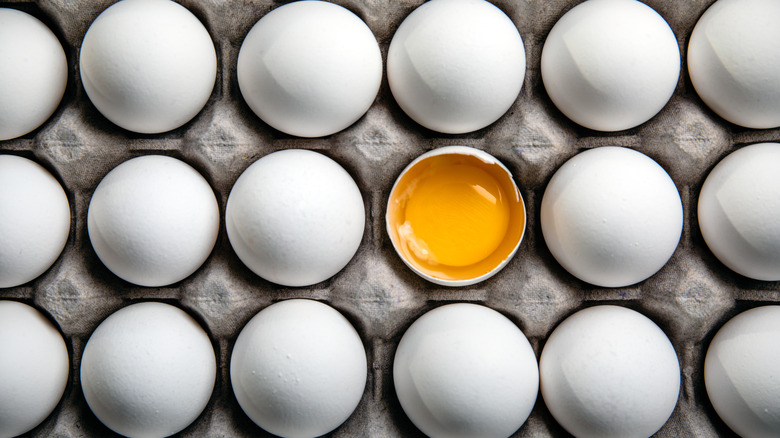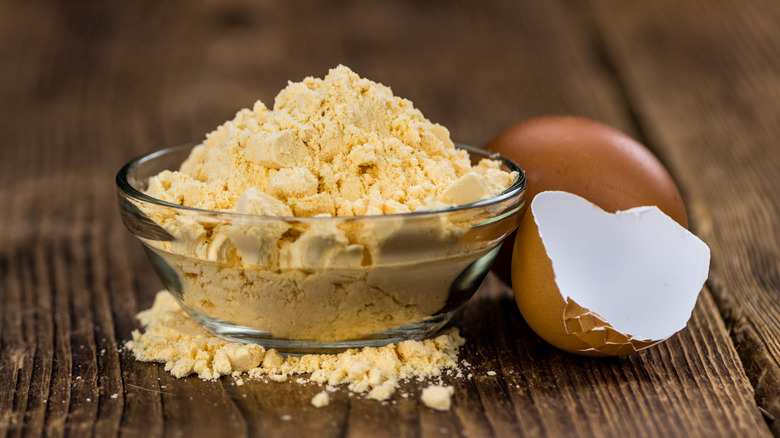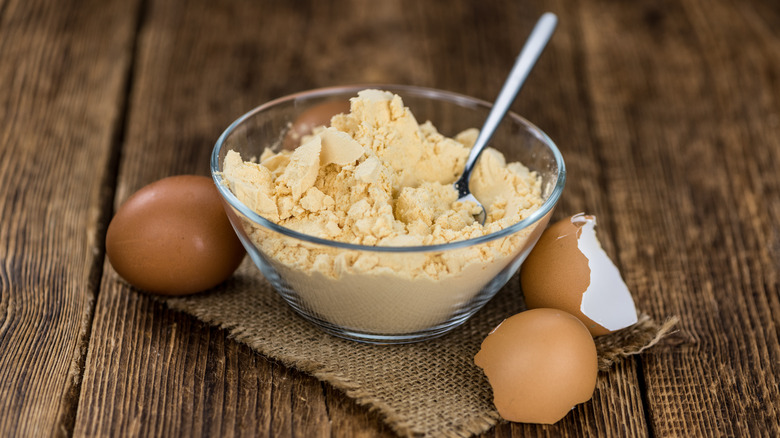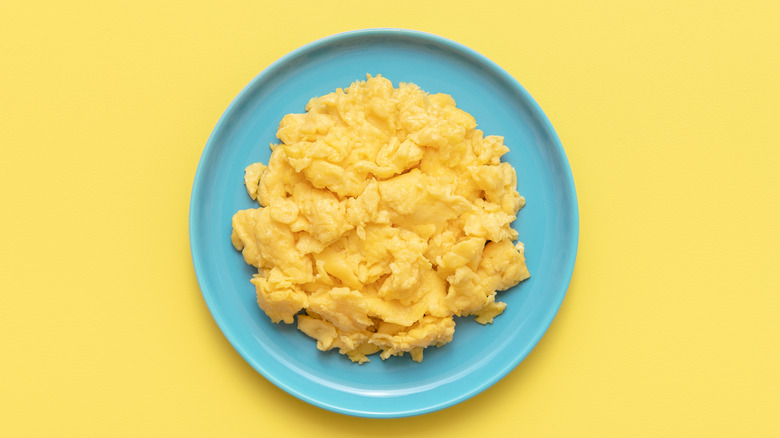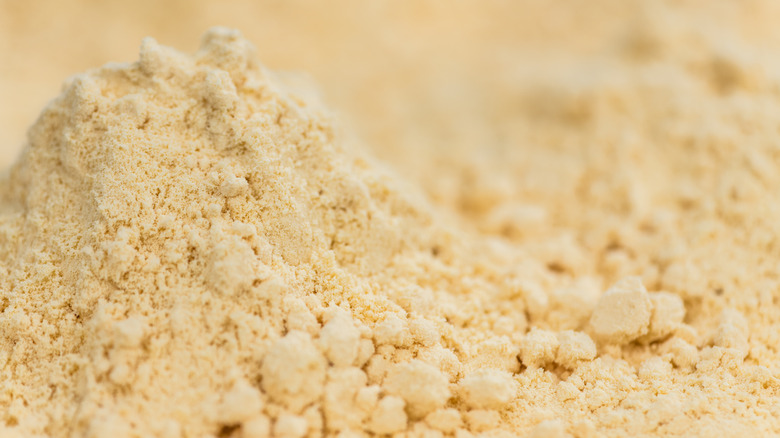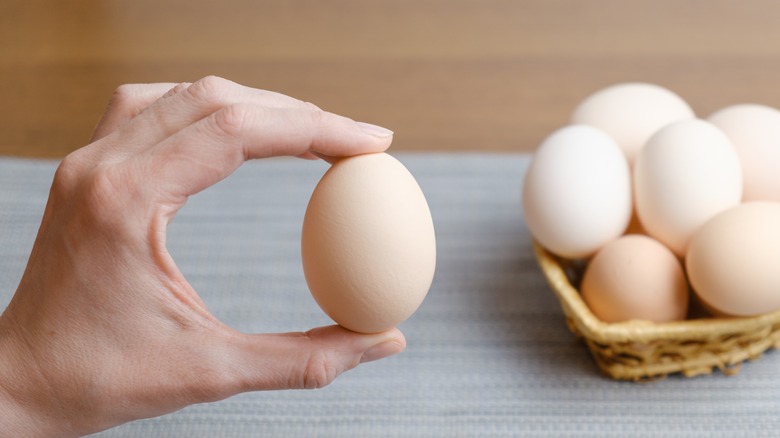What Are Freeze Dried Eggs And Are They More Affordable Than Fresh?
Eggs are a refrigerated staple for many house holds, but if you find that yours tend to hang around too long, you might wonder what other options you have. Fresh eggs do expire eventually, and it can be a pain to take the time to test their freshness. If even liquid eggs might not be used up before the expiration date, then you might want to consider a different, stabilized form of egg: Freeze-dried eggs.
Freeze-dried eggs are a convenient and long-lasting food option for people who enjoy eggs in their diet without keeping fresh eggs. Freeze-drying is a preservation method that removes the moisture from food to extend its shelf life. This process makes freeze-dried eggs a great option for camping trips, outdoor adventures, and emergency food supplies in addition to a back-up pantry staple. While freeze-dried eggs likely are a viable alternative to regular eggs, you just might be surprised by how freeze-dried eggs are made, what they taste like, and how the price compares to regular eggs.
What are freeze dried eggs?
Freeze-dried eggs are eggs that have gone through the process of freeze-drying. This preservation method involves removing the moisture from the egg, which extends its shelf life. Freeze-dried eggs come in a variety of forms, including whole eggs, yolks, and egg whites. They are also available in different preparations, such as scrambled and omelet.
But you might still be wondering: How are freeze-dried eggs different from regular eggs? Freeze-dried eggs are different from regular eggs in several ways. First and foremost, freeze-dried eggs have a much longer shelf life. Regular eggs can last for up to five weeks in the refrigerator, while freeze-dried eggs can last for decades — up to 25 years (via NPR). Additionally, freeze-dried eggs are lighter and more compact than regular eggs, making them easier to store and transport.
Another difference between freeze-dried eggs and regular eggs is that freeze-dried eggs are more convenient. Apart from their convenience, freeze-dried eggs can also be used in every way that regular eggs are. They can be used in a variety of recipes, including baked goods, omelets, and scrambled eggs.
They're made by removing moisture
Unlike regular eggs, the process of making freeze-dried eggs is more complicated and requires several steps. The key goal is to remove the moisture from the eggs, which allows them to be stored for such long periods of time. But first, the eggs are cracked and emptied or separated into yolks and whites. This step solely depends on whether the eggs are intended to be freeze-dried yolks, whites, or whole powdered eggs.
Next, the eggs are then rapidly frozen and placed in a vacuum chamber, where the moisture is removed through a process called sublimation. Sublimation is the process of a substance transitioning from a solid state directly into a gaseous state, bypassing the intermediate liquid state (via MDPI). This process occurs when a solid is heated to a temperature at which its vapor pressure is equal to or greater than the pressure of the surrounding environment, causing the solid to turn into a gas.
Once the moisture has been removed from the eggs and only the solids are left, they can be packaged, sealed, and shipped to stores.
What do freeze dried eggs taste like?
Freeze-dried eggs have a slightly different taste and texture than regular eggs. Because all of the moisture has been removed from the eggs, no steam is created if the eggs are cooked without any added moisture. That means they have a slightly denser and chewier texture. The flavor is slightly more intense too. Some people describe the taste as slightly rubbery, but most find the taste to be similar to regular eggs.
To improve the texture and flavor of the eggs, you might want to reconstitute the freeze-dried eggs before cooking them. If you are incorporating them into a recipe such as a baked good that already calls for plenty of liquid, the eggs should also be reconstituted to prevent them from absorbing some of the excess liquid when they are mixed into the batter. Other than their dry texture straight out of the package, freeze-dried eggs are remarkably similar to regular eggs.
Use freeze dried eggs for these dishes
Freeze-dried eggs can be used in a variety of recipes, including baked goods, omelets, and scrambled eggs. To cook with freeze-dried eggs, simply add water to reconstitute them and then cook them as you would regular eggs. The eggs will need to be rehydrated for about 10 to 15 minutes before cooking or mixing into a batter.
For scrambled eggs, simply add water to the freeze-dried eggs, whisk, and then cook in a pan over medium heat until fully set (via Honeyville). For omelets, add water to the freeze-dried eggs and then cook in a pan with your desired fillings.
If you choose to use freeze-dried eggs in baked goods, you will need to pay attention to the conversion on the package. The package label should include a measurement that represents how much of the freeze-dried eggs you will need to use to replace one single eggs. Keep in mind that freeze-dried eggs will seem like a smaller amount compared to regular eggs since they have no water content.
Where to buy freeze dried eggs
No matter how you plan to use them, there are several types of retailers that sell freeze-dried eggs. Between major grocery stores, online retailers, and most outdoor and camping supply stores, freeze-dried eggs are not difficult to find. For those who enjoy delivery or grocery store curbside pick-up, you can order eggs from Kroger, Walmart, Amazon, or Publix. Outdoor adventure retailers will likely have freeze-dried eggs among other freeze-dried ready meals.
While there are plenty of options to choose from, you might want to consider the size of the package you should get. Freeze-dried eggs come in packages ranging from one-and-a-half-pound bags to buckets with 120 servings or more. Think about when and how you plan to use the powdered eggs and buy a container that has enough eggs to cover your needs without buying more than you ever plan to use — despite the seemingly endless expiration date.
Nutritional information of freeze dried eggs
Freeze-drying eggs is considered to be one of the best methods for preserving eggs because the eggs retain all of their nutrients really well according to Farmhouse on Boone. As for the macronutrients of freeze-dried eggs, you might be surprised by just how much a small amount can pack. Two and a half tablespoons or 13 grams of freeze-dried eggs includes 80 calories, six grams of fat, six grams of protein, and no carbohydrates.
For comparison, there are 85 calories, 5.77 grams of fat, 7.3 grams of protein, and less than half a gram of carbohydrates in a single extra large egg. And according to PureWow, an extra large egg is about 64 grams.
Though the mass is different, the lack of water in freeze-dried eggs allows it to pack more nutrients with a much smaller amount of egg that takes up far less room (via NPR). That's why freeze-dried eggs are a popular option for outdoor adventure sports like backpacking.
Another beneficial side of freeze-dried eggs is that they are more cost-effective than fresh eggs, but to get the best savings, you do need to buy them commercially rather than in a small amount marketed to consumers.
So, no matter how you plan to use freeze-dried eggs, they are a healthy, easy protein-packed option that can withstand time. Despite its very long shelf-life, you just might be surprised how useful and great powdered eggs can be.
